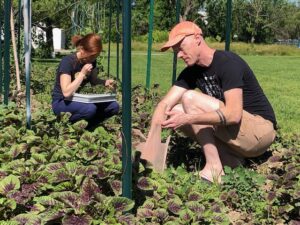
Rob Connoley, who owns Bulrush STL, was foraging near I-170 this morning with three of his staff. Bulrush is the newly-opened restaurant in St. Louis with “contemporary interpretations of historic (1820-1870) Ozark cuisine.”
“Everything is made from scratch, every single day,” Rob said as he picked mulberries from a tree on the grounds of Pinnacle Imports, a wine distributor he uses. “We don’t have a can opener in the restaurant.”
Much of what Bulrush serves is foraged, and so, by definition, local. Rob has outlined the practice of ethical foraging for years, including in his cookbook, Acorns & Cattails: A Modern Foraging Cookbook of Forest, Farm & Field. He no longer buys from other foragers (who may trespass or harvest unsafely), always gets permission from private landowners, and tries to develop land partnerships with them or to offer VIP perks.
Bulrush is meant to “take you back to your fondest food memories,” the website says. Rob told the story of a young woman and her father who dined there recently, to celebrate her graduation from law school. The father called Rob over to praise the collard greens and pork, and unexpectedly got emotional. “This reminded me of the food of my childhood, on a farm in Taiwan,” he told Rob.
Rob said the reaction was “exactly what we’re going for” but had expected it to come only from those who grew up in the Ozarks. He said the universality of food experiences expands the meaning of “soul food.”
Pinnacle Imports is in an industrial area of the city. The QT gas station a block away had shut down all its coffee and slush machines for a boil-order; corn dogs, taquitos, and buffaloed cheese sticks wobbled on rollers. The area seemed an unlikely place for provisioning a high-end restaurant.
Rob said they “very, very rarely” foraged in the city, due to lack of knowledge about pollutants, but this tree had been loaded with black, ripe berries on Friday. Since then, high winds had stripped the tree of everything but green fruit. He admitted ruefully he should have come out Sunday, but, “I needed sleep more than mulberries.” Like all successful restaurateurs he looked tired.
In the end they were able to harvest less than a pint. Chris, the young bar manager, said, “Even a handful is good,” because employee Kelsey pickled them for garnish. Rob had challenged them not to use lemons or limes, since they do not grow in the Ozarks, but told the bar staff, “If you want sour, I can get you sour.”
As we spoke, Rob’s sous chef was down at Hawn State Park, 70 miles south, looking for chanterelles. He and Rob followed the Mycological Society on Facebook, which helped them track the mushrooms’ progress. Blackberries were about to come on strong. There was always something to harvest. Rob lives near Tower Grove Park in St. Louis, where several varieties of plums grow. He likes to make vinegar from them but has to compete with elderly Asian ladies and professional foragers who sell to restaurants.
“Sometimes it gets cutthroat,” he said and laughed. The Bulrush cooler “is just loaded” now, he said, due to their hard work.
From Pinnacle the Bulrush crew drove a mile to what is called St. Louis’ Chinatown. The Dragon Trading Company, a huge restaurant-supply warehouse, had a garden next to its parking lot. The main crop was Chinese Amaranth, but Rob was looking for purslane, which looks like a low-growing jade plant. Most people consider it a weed, and the Dragon Trading Company’s owners were happy to let them take it, especially if they got the roots.
“I love when we do double-duty,” Rob said.
The purslane was plentiful and tasted peppery, like watercress. Rob and Janet, who has worked in Texas and Kansas City, offered Lamb’s Quarters (crisp, tender, and mild) and uncultivated Amaranth (a subtle anise taste).
Rob said they would put it all to good use, but: “We go a little deeper than foraging for salads. Anyone can do that. I don’t just want to put a leaf on the plate. That’s just not my type of restaurant.” One recent dish combined pickled cattail, rhubarb, cucumber, apple, corn flower, chervil, house Amazake, and ramp oil.
The Bulrush crew picked the equivalent of two plastic grocery bags of purslane, all they needed for now. An older man came out of Dragon Trading to tell Rob that in some other, unnamed, place and time, they had no meat, no rice (only potatoes), and had to forage in fields, on sidewalks, and next to roads.
“You couldn’t eat grass,” he said, “but any plant that was soft was good to eat.”
He was delighted with Rob, more for his mission than for weeding his garden. As the Bulrush crew tried to leave with their harvest, the man insisted they take more Shiso—sometimes called “rattlesnake weed” in the Ozarks—and some wild chives, and, here, just a bit more purslane, it was all delicious.
